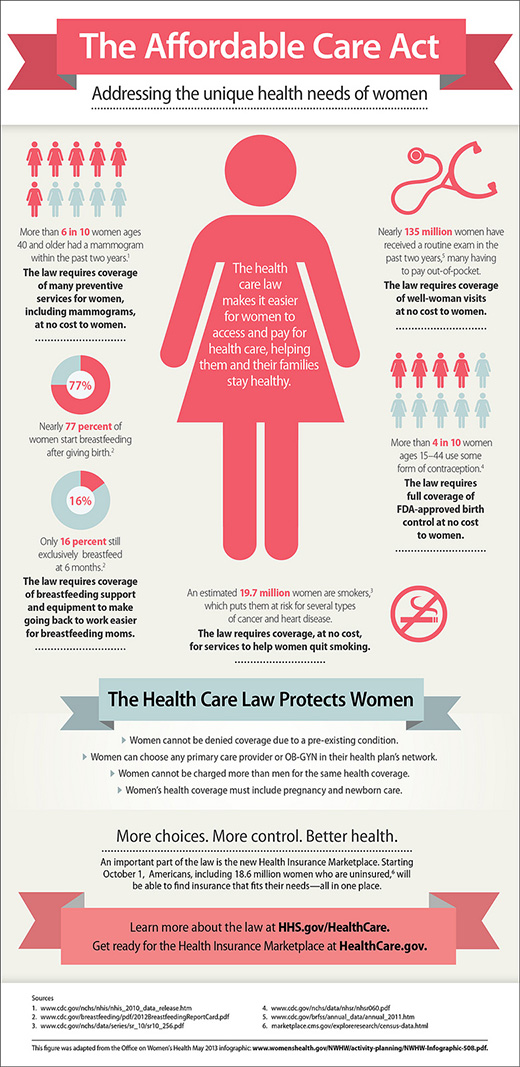
Ed. note: This is cross-posted from hhs.gov. See the original post here.
More than three years ago, the most important women’s health legislation in my lifetime was passed into law — the Affordable Care Act. This law lowers the costs of health care for women, increases access to quality health care, and pays attention to the distinct health needs of women and families. As women, we often make health care decisions for ourselves and for our families, so it is important that we know how the health care law benefits us.
Women have often been charged more than men for the exact same health coverage. We have paid higher premiums and out-of-pocket costs. We also tend to make less than men and have a harder time paying for health care costs. As a result, women have not always had access to the health care they needed or the freedom to make the best health care choices for themselves and their families.
But that’s all changing. The new health care law already requires most health plans and insurance policies to cover recommended preventive services at no additional cost. This means that, each year, a woman can have a well-woman visit with her doctor at no cost to her. It also means we can get free screenings for breast and cervical cancer; FDA-approved contraception; breastfeeding support and equipment; screening and counseling for domestic violence; smoking cessation medications and services; and more. Furthermore, more low-income women will be eligible for Medicaid in 2014 even if they do not have children.
Thanks to the health care law, insurance coverage is also improving for millions of women, ensuring that they can get coverage that meets their unique needs. Starting in 2014, a woman cannot be denied coverage because of a pre-existing or current health condition, like if she’s had breast cancer, depression, or is pregnant. A woman will no longer be charged more for the same coverage as a man just because she’s a woman, meaning that being a woman will no longer be a pre-existing condition. More women will also have access to maternity coverage and care for their newborns. In fact, current estimates show that at least 8.7 million women will gain maternity coverage because of the health care law. And that’s not all. An estimated 62 million Americans will gain expanded coverage of mental health and substance use disorder benefits under the Affordable Care Act.
Starting this October, whether a woman is uninsured or wants to explore new insurance options, she can visit the Health Insurance Marketplace. The Marketplace will give women a whole new way to choose from a range of private health plans that cover essential benefits, including maternity and newborn care, hospitalizations, outpatient visits and prescription drugs. With just one application, they will also be able to determine whether they are eligible for lower monthly premiums for private insurance on the Marketplace or coverage through Medicaid.
HHS estimates that 18.6 million uninsured women will be eligible for coverage through the Marketplace. For the very first time, Americans can go to one place to get accurate information on different plans and make apples-to-apples comparisons on benefits, quality and cost. The Marketplace will be one more tool in our toolbox to help us make the best decisions for ourselves and our families. As Deputy Assistant Secretary for Health (Women’s Health) and the Director of the Office on Women’s Health, I am thrilled by the progress we have made and look forward to all the changes that are to come. Thanks to the Affordable Care Act and the Health Insurance Marketplace, we will soon see fewer uninsured women and families, improved access to preventive services, and equal access to quality health care.
Nancy C. Lee, M.D. is the Deputy Assistant Secretary for Health – Women's Health Director at the Office on Women's Health.


